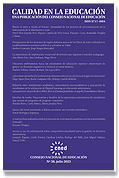Access and Use of Students-Engagement Data to Enhance University Teaching Management
DOI:
https://doi.org/10.31619/caledu.n58.1330Keywords:
information, student engagement, universities, ChileAbstract
This article addresses the challenge of promoting the access to and use of student engagement and experience information to enhance undergraduate teaching management. The study examines the perceptions of specialists in a sample of universities affiliated with the Chilean Council of Rectors (CRUCH) regarding their capacities to collect, distribute, and utilize data from the National Student Engagement Survey (ENCE by its Spanish acronyms). Findings reveal several gaps and organizational obstacles, alongside good practices and promising opportunities for leveraging information to improve the quality of university education. Conclusions provide guidelines for strengthening information management capabilities and fostering an organizational culture centered around evidence-based-decision-making.
Downloads
Published
Issue
Section
License
Copyright (c) 2023 Calidad en la Educación

This work is licensed under a Creative Commons Attribution 4.0 International License.
Authors retain their Copyright and only transfer a part of these to the journal, accepting the following conditions:
Authors keep their rights as authors and guarantee the right to the journal for the first publication of their work, which is simultaneously subject to the Creative Commons Attribution license allowing third parties to share the study accrediting the author and first publication in this journal.
Authors may adopt other non-exclusive license agreements for distribution of the version of the published work (e.g. inclusion in an institutional thematic file or publication in a monographic volume) accrediting initial publication in this journal.
Authors are allowed and recommended to share their work over the Internet (e.g. in institutional telematic files or their website) before and during the submission process, which may lead to interesting exchanges and increased citation of the published work. (See The effect of open access).

